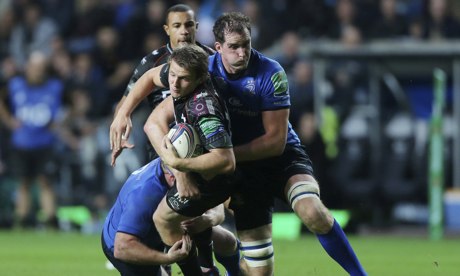
What may be the last Heineken Cup final will be held in Cardiff in May but the prospects of a first Welsh winner receded when the country's strongest region, Ospreys, were subdued by smart, street-wise opponents. Leinster, bundled out at the group stage last season and high on motivation, soaked up pressure like a sponge taking in water and fed off the several mistakes they provoked.
Eight players involved in this summer's Lions tour started, four from each side. Rob Kearney, who was rendered peripheral by injury in Australia, was the only back and it was an unrelentingly physical contest between two teams who in recent seasons have met regularly in the RaboDirect Pro 12 play-offs, with Leinster proving the stronger as well as the wiser.
They are two teams for whom the Heineken Cup means considerably more than a means of pleasing the bank manager. Leinster, the Amlin Challenge Cup holders who had won European club rugby's premier tournament three times in the previous four seasons, were without Brian O'Driscoll, but Ospreys, constrained by a relatively low salary cap, had a back division largely unknown compared to just a few seasons ago when Justin Marshall, Gavin Henson, Shane Williams, James Hook, Lee Byrne and Stefan Terblanche wore the black jersey.
Ospreys' bench, made up largely of emerging players, told the story of Welsh rugby's decline below international level. The debate over the future of the Heineken Cup has shown how the Welsh Rugby Union should be fighting hard to secure the best financial deal for its regions with seven leading internationals out of contract at the end of the season, but there is no sign of that happening.
Ospreys started strongly against opponents they drew with in Dublin last month, Dan Biggar kicking two penalties in the opening nine minutes, but despite establishing an early dominance up front, aided by the departure of the prop Mike Ross with a leg injury on 18 minutes, they made a series of costly errors. After Jimmy Gopperth had scored Leinster's first points with a penalty when Adam Jones had loitered after making a tackle, Ospreys established their best attacking position of the match, a scrum five metres out after turning down the opportunity to kick for goal. Biggar should have been lining up a conversion but, after Tito Tebaldi had wasted an overlap by passing short instead of long, the hooker, Richard Hibbard, trusted his strength rather than his passing ability with Ben John unmarked outside him seven metres out and was hauled down and stripped of the ball.
Leinster wasted the turnover by conceding a penalty for holding on but Ospreys felt the next blast of Wayne Barnes's whistle. Adam Jones was unimpressed to be hauled up for taking up his opponent, but he forfeited a position his side was not to enjoy for another 40 minutes. Ospreys' next attack was from within their own half, but Andrew Bishop was too easily stripped of the ball by Jamie Heaslip and the No8 took off for the home 22.
Three phases later, Sean Cronin broke the tackle of Ashley Beck, again with less difficulty than there should have been, and Sean O'Brien only had to catch the ball to score and put his side ahead for the first time.
When Eli Walker, looking to counterattack, was held up by Devin Toner and conceded a scrum, Ospreys were again penalised for going up and Gopperth, from five metres inside his own half, made it 13-6 at half-time. Biggar landed his third penalty four minutes after the restart after another scrum penalty – of 17 set in the match only three resulted in possession – but the theme remained the same, the defensive pressure exerted by Leinster forcing mistakes. Ospreys could not establish a toehold in Leinster territory and were forced to attack from long range. One move, reminiscent of Wales's victory over England last March, saw the flanker Justin Tipuric arc to the right in the manner of an outside-centre and time his pass to Jeffrey Hassler.
The wing shimmied past two tacklers and got into the Leinster 22 where he had the option of either passing to the flanker Sam Lewis inside him or taking on the last defender, Gopperth. He chose the latter course with Lewis well policed and, lacking room, was tackled into touch. Beck and Bishop continued to cough up the ball against unyielding opponents, and after another turnover Gopperth kicked his fourth penalty two minutes from the end to make the inevitable certain and deny Ospreys the consolation of a bonus point.

